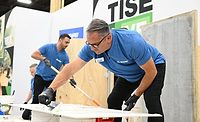U.S. Flooring Manufacturers Remain Optimistic


Allegiance Plus from Shaw’s Floorte Classic Series (WPC) is a made-in-America waterproof plank featuring seven accent bevel options in classic oak and hickory visuals and eight milled bevel options in modern pine and maple visuals.






Whether your products are produced domestically or internationally, you likely felt, and are still feeling, the impact of the coronavirus in one way or another. The pandemic’s effect on the economy and global supply chain has forced manufacturers to be nimble, adjust accordingly and to take practical steps to strengthen and sustain their businesses. As the economy and business begin to recover, flooring manufacturers are moving forward with optimism as they look to the future of their domestic investments.
U.S. Investments Stand on Strong Foundations
AHF has a long legacy of domestic production, tracing back to 1884 with its Bruce hardwood brand. With the addition of the Hartco, Robbins, HomerWood and Capella brands through the years, AHF is now manufacturing more than 90 percent of its total volume in the U.S., with plants in Arkansas, Kentucky, Missouri, Pennsylvania, Tennessee and West Virginia.
The company, which split from Armstrong Flooring just under two years ago, has also made key investments over the past year in the U.S. with the addition of two distribution centers in California and at its Beverly, W.V., plant.
With COVID-19 changing the world as we know it, AHF has adjusted its production levels to align with near-term demand and is positioning itself and its customers to win long-term, says Michael Bell, chief commercial officer. “It’s during these times that the winners of the future are made,” Bell said. ”Consequently, we continue to invest in new products and innovation. We are also continuing to buy lumber for our solid plants due to the six-month drying cycle to ensure we have robust supply. The market will be back and we will be in a great position to support our customers and their needs.”
Throughout the pandemic, Crossville has remained open for business and operational in accordance with the Center for Disease Control’s (CDC) guidelines to keep its employees, customers and all constituents safe. The 34-year-old American company has remained focused on continuously building, growing and nurturing a healthy company.
“We are very thankful for the solid foundation on which Crossville is built,” said Greg Mather, president of Crossville. “We believe this is an opportunity for U.S. manufacturing to increase its relevance with customers seeking to reduce reliance on out of country supply chains. We have invested over the past several years on building a reliable supply chain and as customers have experienced supply disruptions we have been able to provide them alternatives to maintain their business. Our goal is to continue to provide local, dependable options for high fashion products at a good value.”
Also following CDC guidelines and taking consistent preventive measures, Mohawk has been able to safely continue operations, while implementing temporary measures to adjust manufacturing volumes.
“We are doing so in a way that minimizes the impact on our teams and customers as much as possible, while remaining committed to servicing and delivering on customer order requirements,” said Jeff Meadows, president of residential sales. “The company maintains a robust inventory in the U.S. and will continue to monitor inventory levels to ensure we can continue to meet our obligations, even in changing circumstances.”
Additional Investments
Proactive, ongoing engagement, support and conversations are key now more than ever as manufacturers extend their continued support to their retail sales partners.
To answer current needs, Crossville has transformed its full-range of existing materials for online-only consumption and is constantly developing new materials and modes of informing and inspiring those who specify, sell, and install its products. “We even morphed elements of what we would’ve presented in person at trade shows into an interactive, online experience, Virtually Crossville,” said Mather.
Similarly, Shaw’s Retailer Playbook was designed to help its customers navigate the changing retail landscape.
“This comprehensive online toolkit includes free access to marketing campaigns, suggested best practices, financial resources and more,” said Scott Sandlin, executive vice president, Residential Division. “Our residential flooring brands Anderson Tuftex, COREtec, Floorigami and Shaw Floors are all included and our customers can download free marketing content from all four brands, take advantage of special financing programs and explore training resources on how to keep business moving at all levels.”
The Retailer Playbook includes three initial marketing campaigns with customizable assets and social media ads for Facebook and Instagram, including Grab + Go which promotes a safe shopping experience for consumers and features DIY-friendly installation instructions, Shop Local which reinforces the importance of supporting local businesses and Wells Fargo consumer financing which Sandlin says grants 12 months special financing to consumers with approved credit at 0% cost to the retailer.
Retailers can access Shaw’s digital suite of resources 24-7 or tune in for LIVE Learning workshops to engage with Shaw business leaders and subject matter experts, which has been a welcomed resource. Since March, Shaw has hosted more than 80 LIVE Learning workshops with more than 18,000 internal and external attendees, says Sandlin. In addition to taking advantage of online learning opportunities, many retailers have taken this downtime to update and refresh their showroom floors, and Armstrong Flooring is ready to help them get back to business better than before with updated merchandising systems.
“We are making sure that we are giving them some of the key products that need to be there to make them more appealing, so that when customers return, retailers have a story to talk about and have the ability to differentiate themselves,” said Michel Vermette, CEO.
Domestic Appeal
Even in the midst of the pandemic, international flooring manufacturers are taking a leap, moving forward with plans to enter the U.S. market in time for what’s anticipated to be a great comeback for the industry.
Well known for its 5G and Threespine click technologies, Swedish company Välinge Innovation launched its first flooring product in the U.S. in June. Described as the next generation of engineered wood flooring, Välinge introduced to the U.S. market a product that appeals to what consumers have been looking for in flooring, without breaking their bank. “We’ve created a product that allows a broader scope of consumers to get into the wide plank side of the business,” said Zach Adams, general manager, North America. “For years, wide plank was a very niche play and I think a lot of that had to do with the price points. A lot of wide plank visuals, in order to produce an extremely wide plank look, it becomes very costly in order to get a real wood veneer onto a wide visual.”
In addition to having the 5G fold-down locking system with a waterproof joint, the product is manufactured with the Woodura surface technology, which when applied, creates a wood floor that is three to five times harder and more dent-resistant than the original species.
Entering an established market, Välinge is bringing a product to the table that has been designed to stand out with the U.S. consumer in mind. “We have a very wide plank at an affordable price,” said Lennart Thålin, region manager, North and South America. “There are wide planks out there, but they cost a lot. We have impact resistance. Yes, you have a floor that has really good impact resistance as well, but ours has a really good look. We aren’t killing the look of the product.”
Also entering the U.S. market in June, Chinese resilient flooring manufacturer Huali Floors brought its production of high-quality floor covering products, including luxury vinyl tiles, stone plastic composite, and wood plastic composite flooring to Chatsworth, Ga., in a move that is set to create at least 315 new jobs. Investing more than $27 million in its U.S. facility, Huali Floors enters the market well equipped to deliver the waterproof and worry proof floors that U.S. consumers seek.
Forging Ahead
Though the first quarter of 2020 brought unprecedented change to the economy as a whole, these and other flooring manufacturers are keeping customers top of mind as they gear up to move forward in full-swing with their U.S. investments. “In manufacturing, we are investing in capabilities and product innovations that improve customer satisfactions,” said Denise Bird, vice president of manufacturing, Armstrong.
To do so, Armstrong is combining old and new plants and processes by upgrading capabilities and renewing older processes, to do things like keep up with the demand of the growing LVT market. With the installation of a CNC machine, the manufacturer is cutting its high performance sheet structures that are produced in Stillwater, Okla., into practically any size tiles or planks. Bird says the products that are being cut on that line have been so popular that company has since purchased a second machine. From fulfilling orders for temporary and mobile hospital units, to keeping up with the uptick in home centers’ D.I.Y. market, Armstrong employees have worked overtime to respond quickly to meet these and other manufacturing needs.
“I am very appreciative of all of our employees and I’m sure other manufacturers are as well,” Bird added. “When you think about all of the extra safety protocols like having to wear masks, especially as we head into the summer. And in our case, a lot of employees have been working a lot of overtime. I’m appreciative of the effort our employees are putting in to service our customers.”
Looking for a reprint of this article?
From high-res PDFs to custom plaques, order your copy today!










